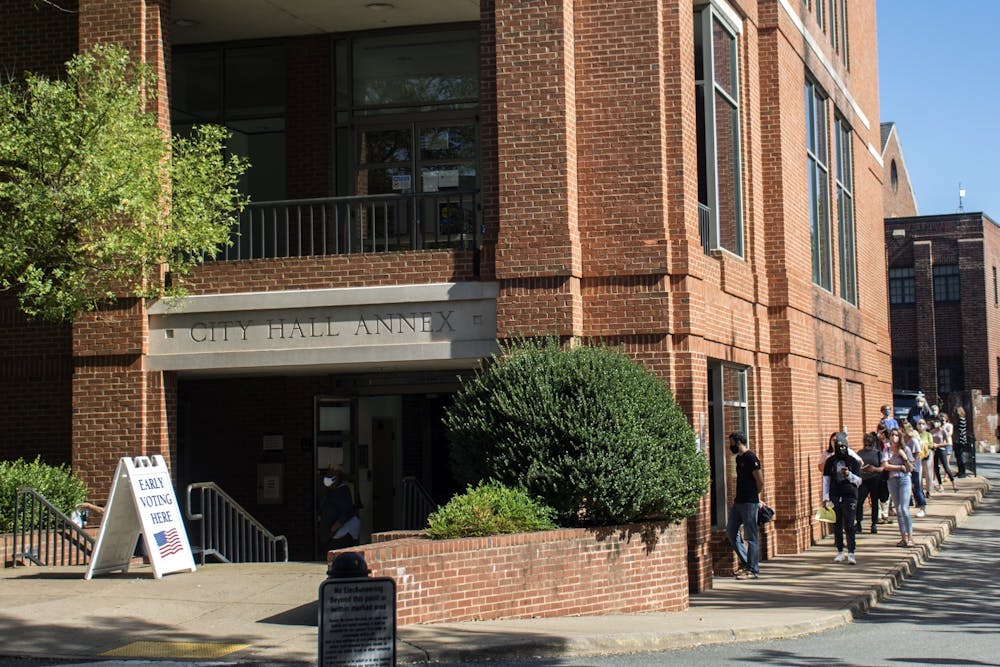Student organizations such as University Democrats and College Republicans have been organizing events to energize and inform voters in an effort to increase voter turnout in the hotly-contested Virginia governor’s race. The race pits former governor and Democrat Terry McAuliffe against Republican Glenn Youngkin, former chief executive officer of the Carlyle Group, a global investment firm.
Both candidates have visited the University and delivered remarks about their campaigns. McAuliffe visited the University Aug. 25 to discuss the importance of requiring COVID-19 vaccines, and Youngkin was at the University Sept. 24 to tailgate for the football game against Wake Forest.
The gubernatorial race has garnered national attention, as it will likely be a preview to the 2022 midterm elections. An average of the most recent general election polls conducted between Sept. 7 and Oct. 3 showed 48 percent of respondents supporting McAuliffe and 44 percent supporting Youngkin.
While in the past, voters have been required to have a reason for voting early or by mail, new laws that went into effect July 1 scrapped that requirement in order to increase accessibility to the polls and boost voter turnout.
Virginia voters are permitted to vote early in-person during the 45-day period before Election Day, according to the Virginia Board of Elections. Oct. 12 is the last day to register to vote for this upcoming gubernatorial election or make changes to voter registration, and the last day to request an absentee ballot is Oct. 22. Registered voters have until Oct. 30 to vote early.
According to the Virginia Public Access Project, nearly 300,000 Virginians have already voted in-person or by mail, and 180,000 have requested mail ballots.
First-year College student Joe Washington, a first-time voter, said he was especially glad to be able to vote early.
“Having the ability to vote early, to get it out of the way, so I don't forget about it was definitely a major help,” Washington said.
Washington said he believes that the University could be doing more to promote civic engagement among students in the early voting process.
“U.Va. definitely should be helping to get their students registered to vote,” Washington said. “Voting is a civic responsibility. So I think a university that bolsters that and gets their students registered to vote is a good reflection of the character of the U.Va. leadership.”
Student Council’s Legislative Affairs Committee plans to allocate $1,500 towards transportation funding for early voting, as well as $350 towards voting efforts and resources. In a Sept. 30 email, Abel Liu, fourth-year College student and president of Student Council, announced that Student Council will also sponsor free Uber and Lyft rides to local early voting sites.
“We will reimburse 200 students for their round-trip Uber or Lyft costs to their local registrar’s office on a first-come, first-served basis,” Liu said.
More information, along with access codes for free rides will be sent out by Student Council soon, according to the email.
Student Council is also lobbying the Albemarle County Electoral Board to have an early voting site on Grounds for future elections.
Student organizations, including the University Democrats and College Republicans, have been getting out the vote in the University community.
University Democrats are hosting voter registration drives multiple times a week and so far have signed up hundreds of students on Grounds to register to vote. Later this month, the organization plans to coordinate carpool services to polling stations for students throughout early voting and Election Day, according to Hunter Hess, fourth-year College student and president of University Democrats.
“We recommend voting early,” Hess said. “This year classes are on Election Day. If [students] are able to go early and get it out of the way, they don't have to worry about any scheduling conflicts.”
Though classes will be held on Election Day this year, there will be no classes on Election Day 2022 and future elections going forward as a result of years of lobbying and advocacy by students, student organizations and professors.
Student Council, Young Democratic Socialists of America at U.Va., University Democrats and College Republicans released a joint pledge last October calling for faculty to not hold classes on Election Day. Around 70 professors and 100 students signed the pledge in support. A similar pledge in 2018 also generated support, but the University stated last year that it would not be cancelling classes because of the adjustments that had already been made to the academic calendar due to the pandemic.
To encourage students to vote, College Republicans have also adopted initiatives such as taking students to the Charlottesville City Registrar to register to vote in-person and walking students through requesting an absentee ballot, according to Libby Klinger, third-year College student and president of College Republicans.
“It's one thing just to request a ballot, but it is another thing to actually request the ballot, fill it out and turn it back in,” Klinger said.
Both University Democrats and College Republicans have made it a priority to follow up with students and cultivate a culture of voting on Grounds. Hess noted that there had been more excitement among voters last year because there was a presidential election, but that it was also crucial to vote in local elections.
“Our main goal is still keeping up that enthusiasm for these local-level races,” Hess said.
In addition to voting for governor, lieutenant governor and attorney general, candidates for the Virginia House of Delegates and other local offices varying by locality will also be on the ballot.
Democratic nominee Hala Ayala, a delegate, and Republican nominee Winsome Sears, a former delegate, are running for lieutenant governor. Incumbent Democrat Mark Herring and Republican Jason Miyares are running for attorney general. In Charlottesville, Republican Philip Hamilton and incumbent Democrat Sally Hudson are candidates for a seat in the Virginia House of Delegates.







